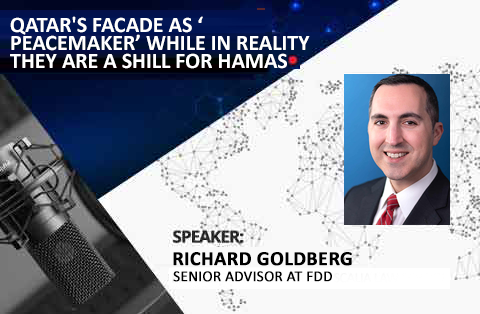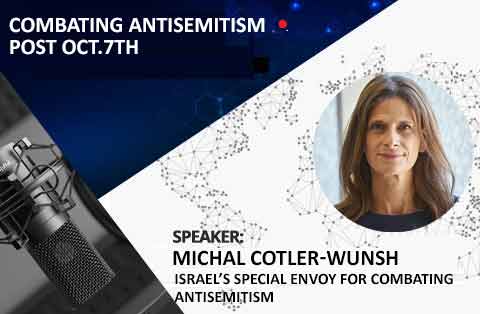Coinciding with the 2019 National Students for Justice in Palestine (SJP) conference held in Minnesota this past weekend, the Institute for the Study of Global Antisemitism and Policy (ISGAP) released an alarming report that exposes the toxic ideology that characterizes this radical campus group.
The ISGAP report, “Antisemitism, Violent Extremism and the Threat to North American Universities: The Contextualization of the National Students for Justice in Palestine (NSJP),” confirms what observers of radicalism in higher education have documented for years: that while SJP purports to be a group whose mission is to achieve a peaceful and just resolution to the Israeli/Palestinian conflict by supporting Palestinian self-determination, in fact, as the report put it, SJP “leaders and official university chapters espouse blatant forms of antisemitism on social media and use the national conferences as a platform to propagate their discriminatory ideas” and “SJP is steeped in an ideology that has roots in racist and antisemitic extremism. It has in recent years become tolerated and overlooked by university administrations as part of the landscape across the US and Canada.”
That toxic campus radicalism has meant that administrators, supporters of Israel, pro-Israel speakers, and Jewish students and organizations have experienced the caustic side-effect of SJP’s presence on campus. As SJP grew more aggressive in its demonstrations and behavior, it occasionally, though rarely has been sanctioned or restrained. In 2014, however, Northeastern University’s Students for Justice in Palestine chapter was suspended for at least a year after a succession of misbehaviors, including having plastered eviction notices around the Northeastern campus—mock eviction notices imitating those Israel uses on Palestinian homes slated for demolition. But that type of censure is rare, even though the toxicity, excess, and frequency of SJP’s actions and violations of student codes of behavior is widespread and well-known, and SJP chapters continue to proliferate.
In 2016, one university, Fordham University in New York, cognizant of SJP’s history of poisoning dialogue on campuses and promoting a campaign of libels, defamation, and lies against Israel and Jewish students, reversed the decision of the student government to allow SJP to become a recognized student organization and decided that SJP, based on its sorry record at other universities, had no place at Fordham. Dean Keith Eldridge, very aware of SJP’s methods and ideology, bravely decided that “while students are encouraged to promote diverse political points of view, and we encourage conversation and debate on all topics, I cannot support an organization whose sole purpose is advocating political goals of a specific group, and against a specific country [emphasis added], when these goals clearly conflict with and run contrary to the mission and values of the University . . . The purpose of the organization as stated in the proposed club constitution points toward . . . polarization,” he added, and suggested “the call for Boycott, Divestment and Sanctions of Israel presents a barrier to open dialogue and mutual learning and understanding.”
SJP immediately sued Fordham, in Awad v. Fordham University, 2019 WL 3550713, asserting that the decision to block it from becoming a recognized student organization was, as the judge ultimately found in reversing the dean’s decision in 2019, “arbitrary and capricious,” and “it must be concluded that [Dean Eldridge’s] disapproval of SJP was made in large part because the subject of SJP’s criticism is the State of Israel, rather than some other nation,” and that “his only articulated concern was that SJP singled out one particular country for criticism and boycott.”
In fact, Fordham’s instincts had been valid, in that the dean knew, based in SJP’s dismal record on campuses elsewhere, of its pattern of radicalism, misbehavior, toxic speech, and regular instances of overtly anti-Semitic behavior. That radicalism has been problematic, particularly since multiple reports from 2015-18 by the AMCHA Initiative, an organization that tracks anti-Semitism and anti- Israelism at universities, “indicate a significant increase in actions which directly harm or threaten Jewish students, including physical and verbal assaults, destruction of property, harassment, discrimination and suppression of speech, at schools with an SJP or similar anti-Zionist chapter.”
Equally serious is the reports’ findings that SJP’s presence resulted in “incidents of Israel-related anti-Semitic harassment increase[ing] 70%.” And as the Fordham dean had accurately predicted—based on SJP’s obsession with calls to boycott only Israel and suppress any and all dialogue in support of Israel, Zionism, or Jews—SJP’s actions on campuses had the end effect that “attempts to exclude Jewish and pro-Israel students from campus activities more than doubled, with expression calling for the total boycott or exclusion of pro-Israel students from campus life nearly tripling.”
Either because it was ignorant of these statistics, or because Fordham had not included them clearly in its defense, in reversing the decision, the Court considered only Eldridge’s primary argument that SJP singles out Israel for opprobrium and calls for boycotts, protected speech which does not in itself violate Fordham’s own mission or codes. That may have been a strategic error, which may have resulted in a successful decision had, instead, Fordham pointed to SJP’s disruption of events and speakers, a toxic ideology, intimidation and harassment of pro-Israel organizations and students, and enmity towards Zionism and Jews generally. That behavior is generally prohibited on campus and would not necessarily be protected by First Amendment considerations.
The Court even suggested as much in its decision, noting that “In his determination, Dean Eldredge does not provide a rational basis for concluding that SJP might encourage violence, disruption of the university, suppression of speech, or any sort of discrimination against any member of the Fordham community based on religion, race, sex, or ethnicity [emphasis added].” Of course, that is precisely what SJP regularly and promiscuously does on campuses around the country, and it is only because craven administrators are concerned about sanctioning minority-based student groups—even if these groups are fomenting a climate of fear, intimidation, and bias wherever they exist—that the group continues to be recognized and allowed to operate.
On the 200 or so predominantly liberal campuses where SJP has been allowed to establish chapters and promote its hateful activism largely without restraint, no administrator, faculty member, or student would obviously ever allow groups such as Aryan Nation, Ku Klux Klan, or the far-right, neo-fascist Proud Boys to even be invited to speak, let alone to create campus chapters of these toxic groups paid for with student funds. Why is it that their poisonous rhetoric, their hateful bias and bigotry, their aggressive physical tactics of intimidation, disruption, and chaos is so clearly repellent and unacceptable to almost all members of a campus community, but that same moral clarity seems to be absent when looking at SJP’s actions and record of toxic activism?
No university would tolerate a white supremacist student group which purported to exist only to promote pride in being white but whose activities wholly involve agitating against minorities, blaming immigrants for the decay in American culture, demonizing blacks for being criminals and disproportionately violent, and ranting against their perception that minorities, and black pride, is inferior to white self-determination. And the entire campus would be up in arms and apoplectic when this group staged Black Inferiority Week events, invited racist speakers to campus to trumpet the defects of minorities in America, and regularly yelled out at rallies and elsewhere such charming chants as, “send them back to Africa,” or “string them up, string them up,” a call to lynch and murder blacks. Would any university anywhere ever charter a white supremacist group like this and tolerate this behavior—even once—without immediate and forceful condemnation, sanctions, and punishment? Of course not.
But those are precisely the behavior and tactics of SJP, except that its target is Israel, Zionism, and Jewish students. Though it positions itself as a benign, pro-Palestinian group seeking to facilitate the obtaining of statehood for the long-aggrieved Palestinians, SJP, in reality, is dedicated to only one goal: continually attacking Israel, promoting student government resolutions calling for boycotts against Israeli institutions and divestment from companies doing business with Israel, mounting annual hate-fests known as Israeli Apartheid Weeks, and, most seriously, refusing to enter into dialogue with any pro-Israel campus organizations and doing its best to interfere with, disrupt, and antagonize any speakers or events meant to support Israel.
So, while the white supremacist group might chant their desire to lynch blacks to rid the country of them, SJP regularly chants an equally grotesque threat, “Intifada, intifada. Long live the intifada,” in other words, extolling the homicidal rampage in Israel in which psychopathic terrorists have used missiles, knives, guns, stones, and vehicles to randomly murder Jewish civilians. In fact, the use of that word “intifada” is a grotesque and murderous reference to the Second Intifada that began in 2000, during which Arab terrorists murdered some 1000 Israelis and wounded more than 14,000 others. But the call for intifada is very frequently heard at both SJP-sponsored events and even at pro-Israel events where SJP decides it will heckle, disrupt, or shut down events where the participants have a different view of the Israeli/Palestinian debate, Zionism, or even Judaism itself.
Similarly, SJP protestors are fond of shouting out the oft-heard slogan, “From the river to the sea, Palestine will be free.” That phrase suggests the same situation that a rekindled Intifada would help bring about, namely, that if the fictive nation of “Palestine” is “liberated,” is free, there will be, of course, no Israel between the Jordan River and the Mediterranean—and no Jews. So SJP obviously feels that the Palestinians will realize “justice” only at the expense and to the detriment of, the Jewish state, and their guiding aspiration is not “two states living side by side in peace,” but the complete extirpation of Israel, suffocating completely Jewish self-determination.
A university should, and must, have the right and responsibility to its respective community to decide which student groups have a legitimate and valid mission and which are animated by extremist ideology and penchant for spreading bigotry, ethnic hatred, and misreading of history and facts—exactly what SJP has been guilty of wherever chapters have been established. That Fordham or any other university cannot with good conscience refuse to allow a chapter to find a bulwark on its own campus speaks to the moral vacuity of many administrators, as well as their fear of offending what they perceive to be a campus victim group. So while they would not hesitate for a moment to condemn and purge their campus of a group whose sole mission was to attack and dehumanize any other ethnic group, when Israel and Jews are the targets, sadly there is an absence of clear conscience, justice, and equity.
“Facts do not cease to exist because they are ignored,” Aldous Huxley once observed, and if universities continue to ignore the poisonous radicalism in their midst, if they do not rid their campuses of toxic extremism and bigotry, they do so at their own peril.




